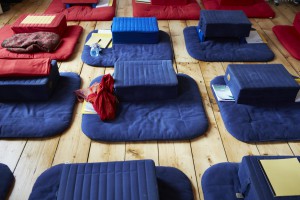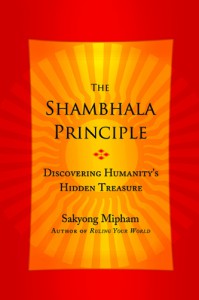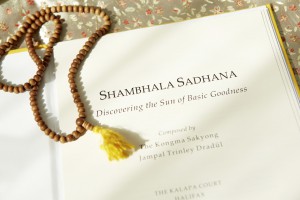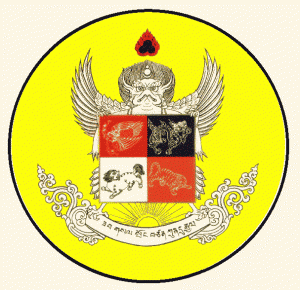 The Shambhala teachings combine the deepest wisdom from an ancient tradition based in Tibetan Buddhist philosophy and psychology, with a completely contemporary body of practices, to bring the deep benefits of meditation into everyday life. These practices include a wide array of sitting meditation techniques, along with transformative tools for being more present and compassionate in all aspects of daily life.
The Shambhala teachings combine the deepest wisdom from an ancient tradition based in Tibetan Buddhist philosophy and psychology, with a completely contemporary body of practices, to bring the deep benefits of meditation into everyday life. These practices include a wide array of sitting meditation techniques, along with transformative tools for being more present and compassionate in all aspects of daily life.
These teachings, available to anyone of any background, can help us work with fear, build confidence, and be more present in relationships, at work, at home, and everywhere else.
The Way of Shambhala program of courses and weekend retreats offers an experiential overview of these practices, teachings, contemplative arts, and physical disciplines rooted in the ancient traditions of Shambhala and Vajrayana Buddhism.You are welcome to participate to the extent you wish. Sample a course or a weekend retreat—or a number of them—at any time. The full program is described below.
Program Outline
The Way of Shambhala consists of the following elements:
- The Everyday Life series—five introductory courses, with five weekly classes in each;
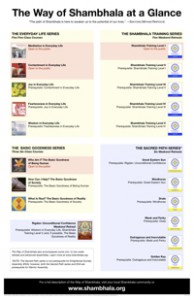
- The Shambhala Training series—five progressive weekend retreats;
- The Basic Goodness series—three courses, presented weekly or as weekends;
- Rigden: Unconditional Confidence—a culminating weekend retreat; and
- The Sacred Path series—five “graduate level” weekend retreats.
The courses are interactive, communal, and create a learning environment where the teachings are intimate and relevant. Participants train in meditation, and use inquiry, dialogue, and contemplative arts to integrate the teachings.The weekend retreats are opportunities to deepen meditation practice in a powerful environment that meets the needs of a workweek and family life.
You may start with any series except the Sacred Path. In each series, the courses or weekend retreats are designed to be taken sequentially. For example, Shambhala Training participants progress from Level I to Level V in sequence.
The Everyday Life Series and the Shambhala Training Series
Anyone may take either the Everyday Life courses, the Basic Goodness Series, or the Shambhala Training weekend retreats exclusively. The combination of courses and weekend retreats can profoundly deepen and extend meditation.
Course 1: Meditation in Everyday Life
The grand kickoff! This 5-week course provides students with the basic tools and teachings for working with mindfulness meditation in everyday life
Open to the public
Weekend Retreat 1: Shambhala Training Level I
The other grand kickoff! Level I marks the starting point of the Shambhala path of weekend city retreats. This first level focuses on the profound technique of mindfulness meditation. Open to the public
Weekend Retreat 2: Shambhala Training Level II
This weekend explores how meditation practice can help us observe and understand the way we create a “cocoon” of habits to mask our fear and anxiety. If this sounds at all familiar, you’re not alone.
Prerequisite: Shambhala Training Level I
Course 2: Contentment in Everyday Life
This 5-week course provides a further exploration of mindfulness meditation, along with some foundational Buddhist teachings. Cultivating contentment means difficult emotions (“grrrr!”) and the challenges of life (“You’re leaving me?”) can be met with some degree of gentleness, steadiness, and humor.
Open to the public
Weekend Retreat 3: Shambhala Training Level III
This weekend poses the question: What would it mean to step beyond our habitual anxieties and dare to relate to the world more directly, free of our habitual filters?
Prerequisite: Shambhala Training Level II
Course 3: Joy in Everyday Life
This course examines the Buddhist teachings on compassion. If our normal mantra is “What about me?”, flipping that into “What about you?” (even just a little bit) can be profound and have wide-reaching implications in our own search for happiness.
Prerequisite: Contentment in Everyday Life
Weekend Retreat 4: Shambhala Training Level IV
This weekend explores how we give way to our innate inquisitiveness by extending further beyond the boundaries of the “cocoon”.
Prerequisite: Shambhala Training Level III
Course 4: Fearlessness in Everyday Life
Soaring on the wings of hope and fear, we often crash and burn. What happens if we begin to see life as it is? This course incorporates a further exploration of the Buddhist teachings on mind and the nature of reality.
Prerequisite: Joy in Everyday Life
Weekend Retreat 5: Shambhala Training Level V
What would it mean to trust our nature enough to fully let go into the present moment?
Prerequisite: Shambhala Training Level IV
Course 5: Wisdom in Everyday Life
This final 5-week course includes practical instructions for transforming confused emotions and situations into effective actions as they arise. No longer deterred (“Grrr!”) or depressed by obstacles (“You’re leaving me?”), we can include everything as part of the path.
Prerequisite: Fearlessness in Everyday Life
The Basic Goodness Series
The Basic Goodness series introduces the view of Shambhala in an experiential way. The key difference between the Everyday Life courses and the Basic Goodness courses is that the Everyday Life courses emphasize personal transformation in daily life, whereas the Basic Goodness courses emphasize the experiential study of view and meaning.
While you may start with this series, we strongly recommend that you receive basic meditation instruction in advance (at a Shambhala open house or Learn to Meditate class, for instance).
Course/Weekend 1: Who Am I? The Basic Goodness of Being Human
This course asks the question, “Who am I?” and explores the sense of self. It includes teachings on basic goodness, selflessness, the arising of ego and cocoon, buddha-nature, and the confidence of warriorship. We practice contemplative investigations of the self, based on the foundations of mindfulness.
Open to the public
Course/Weekend 2: How Can I Help? The Basic Goodness of Society
This course asks the question, “How can I help?” and explores our relationships with others, an aspiration to help our world, and specific aspects of social transformation. We look at a Shambhala understanding of society, and what enlightened society may be. Is society something that is ultimately confused, or is there goodness in human society? The course focuses on transforming four aspects of society: family life (household), professional life, entertainment, and economy. We learn the traditional mahayana practice of “sending and taking” (tonglen).
Prerequisite: The Basic Goodness of Being Human
Course/Weekend 3: What Is Real? The Basic Goodness of Reality
This course asks the question, “What is real?” and focuses on a study of the phenomenal world. It emphasizes core Buddhist teachings, such as impermanence, the process of perception, the “mind,” and emptiness. It is oriented toward the experience of sacred world, the magic and wonder of the natural elements. The course also has an ecological emphasis.
Prerequisite: The Basic Goodness of Society
Rigden: Unconditional Confidence
Those who have completed the Shambhala Training weekends and weekly courses are invited to attend this culminating weekend, exploring how Contentment, Joy, Fearlessness and Wisdom lead to Unconditional Confidence. This final WOS I weekend introduces the Shambhala teachings of enlightened leadership.
Prerequisite: Wisdom in Everyday Life, Shambhala Training Level V, and, if possible, The Basic Goodness of Reality
The Sacred Path Series
The Sacred Path series is a sequence of advanced Shambhala Training weekend retreats based on the unique inner teachings of Shambhala. You may start the Sacred Path series anytime after completing the Rigden weekend retreat; however, we encourage you to attend Enlightened Society Assembly (ESA) before starting this series. Both the Sacred Path series and ESA are prerequisite for Warrior Assembly.
Weekend Retreat 1: Great Eastern Sun & Windhorse
Great Eastern Sun teaches us how to see the primordial energy and brilliance that is the basis of all that exists, and emphasizes the living context for building a sane society
In Windhorse, one begins studying The Letter of the Black Ashe, a Shambhala text that gives the instruction for “raising windhorse,” which opens the heart and refreshes one’s confidence. The practice is a way to bring about skillful and heartfelt social engagement, enabling the warrior to go forward in the midst of whatever challenges occur. Prerequisite: Rigden: Unconditional Confidence
Weekend Retreat 2: Drala
Through exploring the depth of perception, one engages the elemental and magical strength inherent in the world. The principle of drala refers to the sacred energy and power that exists when we step beyond aggression. Prerequisite: Windhorse
Weekend Retreat 3: Meek and Perky
“The four dignities” are further explored as a path and a process, which describe a warrior’s maturing and widening sphere of benevolent engagement in the world. The training in the dignities allows one to maintain awareness and delight at each stage.
Meek (the dignity of the Tiger) & Perky (the dignity of the Lion) are studied from the point of view of The Letter of the Black Ashe text and commentaries. Prerequisite: Drala
Weekend Retreat 4: Outrageous and Inscrutable
These fruitional dignities refer to the extraordinary skill of a practiced warrior.
Outrageous (the dignity of the Garuda) & Inscrutable (the dignity of the Dragon) are studied from the point of view of The Letter of the Black Ashe text and commentaries. Prerequisite: Meek and Perky
Weekend Retreat 5: Golden Key
This weekend retreat is based on a Shambhala text that works with our relationship to the “material world” and our sense perceptions. It teaches the practice of enriching presence—the ability to instantly sense the inner wealth within oneself, phenomena, and the natural world. Prerequisite: Outrageous and Inscrutable
* * *
Now What?
To get started, check out the Programs page of our website to find the dates of our next Learn to Meditate Program, Shambhala Training Level 1 weekend, Meditation In Everyday Life course or Basic Goodness courses or contact us by email to get details of planned programs. Remember, you don’t have to do the whole WOS series to get a good introduction to meditation practice. The best way forward is one step at a time.
Then What??
Dathün / Weekthün
Dathün (Tibetan for “month session”) is a one-month group meditation retreat lead by a senior teacher. You can attend for a full month, or by the week. It is open to anyone and is a very powerful introduction and deepening of mindfulness-awareness meditation. Each day consists of alternating periods of sitting and walking meditation with time for talks, study, and a short work period. Silence and functional talking are observed throughout the day. Meals are served in the shrine room oryoki-style, a practice of mindful eating taken from the Zen tradition. There is regular individual instruction with trained meditation instructors.
There are four practice centers in the Shambhala mandala that offer dathüns at different times of the year: Dechen Chöling in France; Karmê Chöling in Vermont; Shambhala Mountain Center in Colorado, and Dorje Denma Ling in Nova Scotia.
Enlightened Society Assembly
The Enlightened Society Assembly (Sutrayana Seminary) is a Shambhala mahayana program that emphasizes the view of the intrinsic goodness of all beings, practices that rouse bodhichitta and compassionate openness, and confident activity that engages fully in the world. In particular, living up to its name, this Assembly will focus on how we can create enlightened society on the spot, at home, in our city and nation, and wherever we go. Enlightened Society Assembly is a pre-requisite for attending Warrior Assembly.
Warrior Assembly
During Warrior Assembly, students study the Shambhala terma text, The Golden Sun of the Great East, and receive the advanced Shambhala practices of stroke and lungta. Warrior Assembly is a pre-requisite for attending Sacred World Assembly (Vajrayana Seminary).
Sacred World Assembly
This advanced Assembly (formerly Vajrayana Seminary) is designed to deepen students’ practice and understanding of the buddhist and Shambhala teachings and to enter them into the vajrayana practices of the Shambhala Buddhist mandala. Enlightened Society Assembly and Warrior Assembly are prerequisites for this program.
Sacred World Assembly, is led by Sakyong Mipham Rinpoche and authorizes students to begin their Shambhala ngöndro the preliminary practices for receiving the Rigden Abhisheka.

